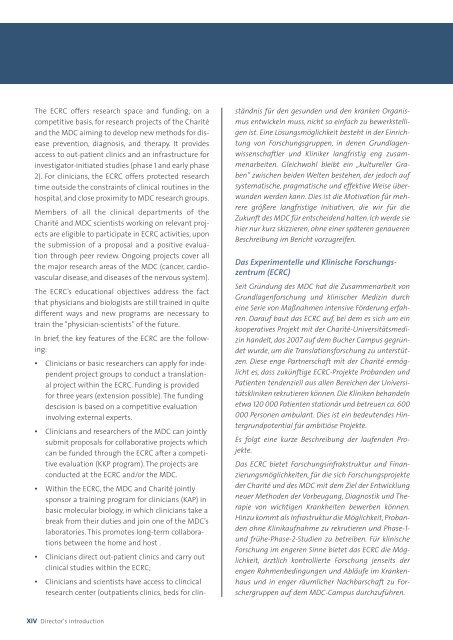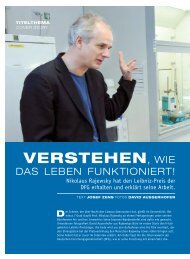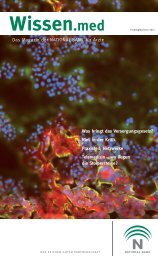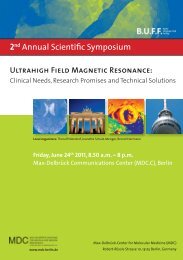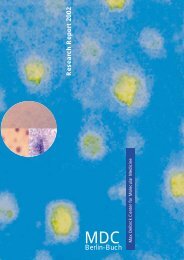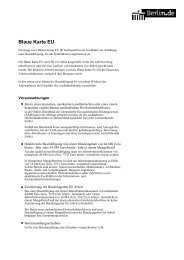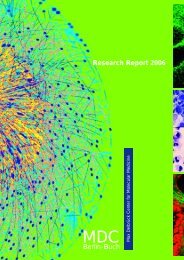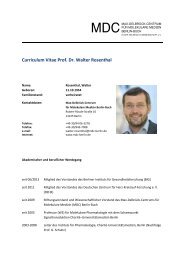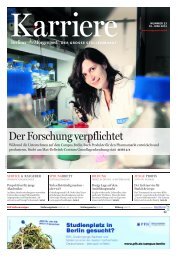Research Report 2010 - MDC
Research Report 2010 - MDC
Research Report 2010 - MDC
Create successful ePaper yourself
Turn your PDF publications into a flip-book with our unique Google optimized e-Paper software.
The ECRC offers research space and funding, on acompetitive basis, for research projects of the Charitéand the <strong>MDC</strong> aiming to develop new methods for diseaseprevention, diagnosis, and therapy. It providesaccess to out-patient clinics and an infrastructure forinvestigator-initiated studies (phase 1 and early phase2). For clinicians, the ECRC offers protected researchtime outside the constraints of clinical routines in thehospital, and close proximity to <strong>MDC</strong> research groups.Members of all the clinical departments of theCharité and <strong>MDC</strong> scientists working on relevant projectsare eligible to participate in ECRC activities, uponthe submission of a proposal and a positive evaluationthrough peer review. Ongoing projects cover allthe major research areas of the <strong>MDC</strong> (cancer, cardiovasculardisease, and diseases of the nervous system).The ECRC’s educational objectives address the factthat physicians and biologists are still trained in quitedifferent ways and new programs are necessary totrain the “physician-scientists” of the future.In brief, the key features of the ECRC are the following:· Clinicians or basic researchers can apply for independentproject groups to conduct a translationalproject within the ECRC. Funding is providedfor three years (extension possible). The fundingdescision is based on a competitive evaluationinvolving external experts.· Clinicians and researchers of the <strong>MDC</strong> can jointlysubmit proposals for collaborative projects whichcan be funded through the ECRC after a competitiveevaluation (KKP program). The projects areconducted at the ECRC and/or the <strong>MDC</strong>.· Within the ECRC, the <strong>MDC</strong> and Charité jointlysponsor a training program for clinicians (KAP) inbasic molecular biology, in which clinicians take abreak from their duties and join one of the <strong>MDC</strong>’slaboratories. This promotes long-term collaborationsbetween the home and host .· Clinicians direct out-patient clinics and carry outclinical studies within the ECRC;· Clinicians and scientists have access to clincicalresearch center (outpatients clinics, beds for clinständnisfür den gesunden und den kranken Organismusentwickeln muss, nicht so einfach zu bewerkstelligenist. Eine Lösungsmöglichkeit besteht in der Einrichtungvon Forschungsgruppen, in denen Grundlagenwissenschaftlerund Kliniker langfristig eng zusammenarbeiten.Gleichwohl bleibt ein „kultureller Graben“zwischen beiden Welten bestehen, der jedoch aufsystematische, pragmatische und effektive Weise überwundenwerden kann. Dies ist die Motivation für mehreregrößere langfristige Initiativen, die wir für dieZukunft des <strong>MDC</strong> für entscheidend halten. Ich werde siehier nur kurz skizzieren, ohne einer späteren genauerenBeschreibung im Bericht vorzugreifen.Das Experimentelle und Klinische Forschungs -zentrum (ECRC)Seit Gründung des <strong>MDC</strong> hat die Zusammenarbeit vonGrundlagenforschung und klinischer Medizin durcheine Serie von Maßnahmen intensive Förderung erfahren.Darauf baut das ECRC auf, bei dem es sich um einkooperatives Projekt mit der Charité-Universitätsmedizinhandelt, das 2007 auf dem Bucher Campus gegründetwurde, um die Translationsforschung zu unterstützen.Diese enge Partnerschaft mit der Charité ermöglichtes, dass zukünftige ECRC-Projekte Probanden undPatienten tendenziell aus allen Bereichen der Universitätsklinikenrekrutieren können. Die Kliniken behandelnetwa 120 000 Patienten stationär und betreuen ca. 600000 Personen ambulant. Dies ist ein bedeutendes Hintergrundpotentialfür ambitiöse Projekte.Es folgt eine kurze Beschreibung der laufenden Pro -jekte.Das ECRC bietet Forschungsinfrakstruktur und Finanzierungsmöglichkeiten,für die sich Forschungsprojekteder Charité und des <strong>MDC</strong> mit dem Ziel der Entwicklungneuer Methoden der Vorbeugung, Diagnostik und Therapievon wichtigen Krankheiten bewerben können.Hinzu kommt als Infrastruktur die Möglichkeit, Probandenohne Klinikaufnahme zu rekrutieren und Phase-1-und frühe-Phase-2-Studien zu betreiben. Für klinischeForschung im engeren Sinne bietet das ECRC die Möglichkeit,ärztlich kontrollierte Forschung jenseits derengen Rahmenbedingungen und Abläufe im Krankenhausund in enger räumlicher Nachbarschaft zu Forschergruppenauf dem <strong>MDC</strong>-Campus durchzuführen.XIV Director's introduction


